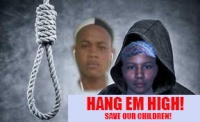The judge, at the same time, urged that the names of Barnett's victims — 31-year-old mother Kimesha Wright, her children 15-year-old Kimanda Smith, 11-year-old Shara-Lee Smith, five-year-old Rafaella Smith, and 23-month-old Kishawn Henry — be immortalised.
He went further to single out Wright, noting that the young mother should be celebrated for her ambitious nature and generosity of spirit and not blamed for unwittingly opening her home and heart to her cousin who eventually butchered her and her offspring.
Justice Pusey, who said he "struggled for adjectives" to describe the "direct viciousness" of Barnett — who knifed the five to death in a calculated pre-dawn attack at their house in Cocoa Piece, Clarendon, in June — declared, "What we need to remember in this matter is the lives of the persons who lost their lives, and I have deliberately been mentioning their names continuously. I have also been deliberate in not mentioning the name of the accused man because it is my eternal hope that we will forget his name, although it seems as if his name has [gone] wide and abroad...
"In the same way as other persons who have committed similar offences, they've become a footnote and are only remembered when we look for legal precedence. I would hope that we remember these persons. Miss Wright, in particular, was significant as a young woman who was looking after her four children and also studying and finding time to run a shop," he said.
He noted that the three eldest children "would have been in school and had their own hopes and dreams and the possibility of them joining their father overseas".
"Kishawn Henry (smallest child), his father will not have the opportunity of seeing him go to school," the judge stated.
"I think it's important also to remember, for Miss Wright, that she was somebody who, despite the difficulties she had, she was still able to be generous enough to try to help somebody who was in need. And I think it was important enough for us to celebrate that generosity, and don't think of it as something which opened her to the situation that happened. In other words, it was not her fault, it was others who were responsible," Justice Pusey said solemnly.
In handing down the sentences the judge — who said he deliberately avoided mentioning the details of the injuries of the deceased five, given the presence of their family members — said, "This is a crime for which adjectives and descriptions were insufficient and which shocked and horrified a nation, even in this country which has unfortunately gotten too used to murder."
In pointing out that both the Crown and the defence had proposed life sentences for Barnett, given that the death penalty had been taken off the table, as Barnett had pleaded guilty, Justice Pusey said the major issue to be decided by the court had been the relevant time the convict would serve before being eligible to be considered for parole.
Justice Pusey, however, was at pains to point out that parole was "by no means automatic".
"Eligibility for parole means that at the expiration of the time the person may apply for parole, and if they are deemed sufficiently suitable, they may have supervised release from custody. The parole board will look at several factors, including the prisoner's behaviour in custody, the nature of the offence, and whether he is still a threat, and the presence of a suitable place to go," the judge noted.
"A person on parole is always under supervision and can be recalled at any time. In short, eligibility for parole does not mean an automatic release from custody. The most a prisoner can hope for is supervised release under stringent conditions," he added.
The judge, who said that the crimes fell under "the most serious category" recognised in law, told the court that in arriving at the sentence he took note of the report of a forensic psychiatrist who, after assessing Barnett, said he had no major mental illness but that he "displayed features which suggest that he has an antisocial personality disorder".
According to the doctor, he found that Barnett understood the nature of the offence but was not acting under any abnormality of mind when he committed the offence. He said although Barnett indicated that he heard voices, his examination of him did not uncover any signs of delusion in his history. He further said Barnett "appeared eager to deflect responsibility for the alleged offence to his cousin's mother by claiming that she caused obeah to be on him".
This disclosure had Wright's mother and aunt looking in Barnett's direction and shaking their heads in disbelief.
Justice Pusey, ahead of directly addressing Barnett, said he "found instructive" a note by one of the officials that Barnett — who appeared to be superficially charming, deceitful, lacking in empathy and remorse at the time of the evaluation— had expressed the desire to be given oral medication, placed in a single cell, and to remain in custody for a year before being released on the current charge.
Barnett did not benefit from a discount in his sentence because of his guilty plea, given the circumstances of the particular case, Justice Pusey said.
"The multiple murders that this accused man has been charged for, based on the legislation, does not fall within the rubric that the legislation allows for him to get a discount. The brutal nature of the offences means that any discount would bring a sentence that this court would give below what I would think is a fair and cogent sentence. Under those circumstances I would not give a discount," the judge said in outlining his reasons.
While declaring that the matter "approached the category of one that could attract the death penalty" Justice Pusey said, "We really have no precedence in our annals and I daresay I hope we have none after today."
The judge said the case of Jeffery Perry — who was convicted in 2008 for the 2005 murders of three children in Killancholly, St Mary, and sentenced to life imprisonment on all counts — was the case which came closest, as well as the case of Mark Henry, who was this month sentenced to life for the murder of three children, one of whom was his own.
"For me, therefore, the minimum sentence is 20 years before eligibility for parole and I would agree with the Crown that for this matter the range would be life with 20 years as a minimum and a maximum of 60 years before eligibility for parole," he told the court.
From a starting point of 55 years the judge added two years for each of the five aggravating factors he identified, taking the total to 65 years from which he then deducted three years for the mitigating factors, which included the four months spent in custody by the convicted youngster.
"His sentence would be on each offence for the lives of Kimehsa Wright, Kimanda, Shara-lee, and Raphaella Smith, and Kishawn Henry, a life sentence on each count with eligibility for parole after 61 years and eight months. The sentences are to run concurrently," the judge ordered.
Based on the sentence Barnett would not be eligible for parole before his 85th birthday.
Barnett, sporting a brightly hued tropical-themed shirt teamed with a two-toned baggy pants the legs rolled, sat in the dock, his sleep-deprived eyes darting in his fair face, his brows furrowed.
While seated he fiddled with his fingers, his lightly folded hands between his splayed legs. He stood to hear his sentence and plucked at the wooden slats in the dock with his fingers.
A grieving Gwendolyn McKnight, mother and grandmother of the deceased, clad in a light blue top and printed skirt, sat solemnly, her arms folded beneath her bosom, her eyes at times downcast, supported by her sister Leonora.
Private Kishawn Henry, the father of the smallest child and Wright's companion, sat clad in a grey pants and white shirt with a faraway look in his eyes, his lithe body slightly hunched forward, his elbows and forearms resting partially on his legs for the most part.





